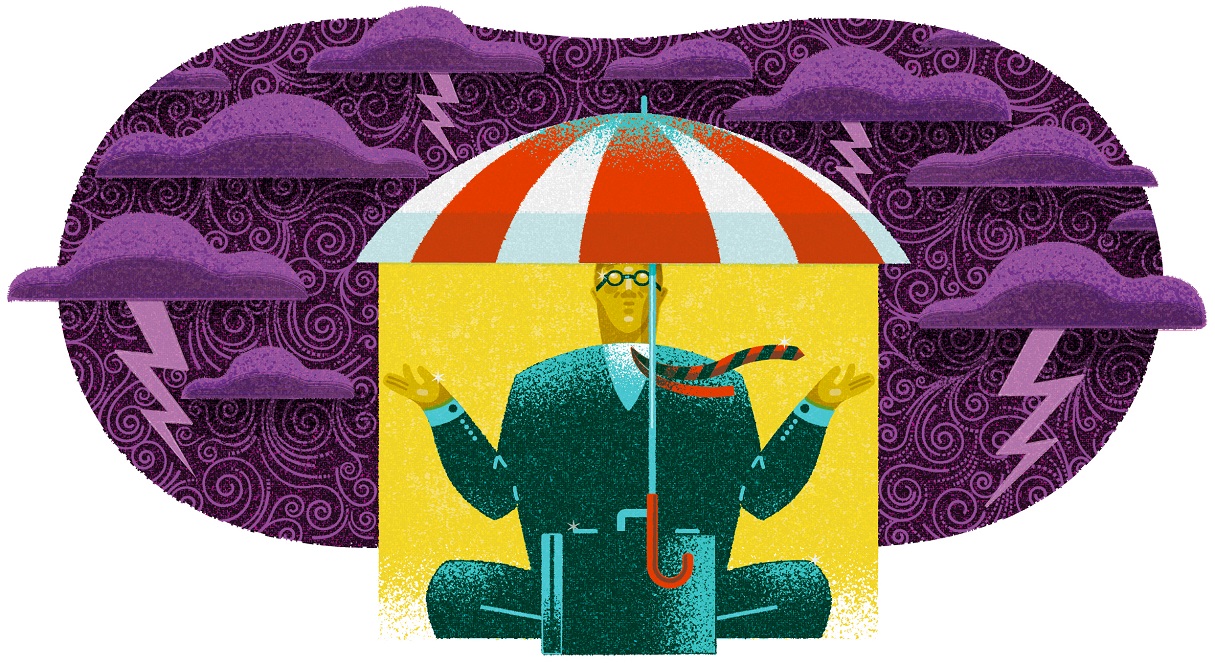How financial professionals can help clients—and themselves—navigate stressors
Producers have always had to help clients navigate through the emotional complexities of planning and managing their financial lives. But today, that’s a growing challenge, as clients bring their concerns about everything from rising interest rates and growing inflation to gas prices, housing costs, and potential job losses. In addition, producers may also be contending with their own challenges, such as pressure on fees and margins, increasing competition, keeping up with complex regulations, and the challenges of building a quality staff.
"Stress can have a significant impact on producers, affecting their productivity and relationships with clients."
The result is often increased stress for producers. During the Great Recession, 1 in 4 financial professionals experienced severe post-traumatic stress disorder (PTSD) symptoms, according to a 2012 study conducted by Kansas State University researchers. Another study, done by the Financial Planning Association, found that 71% of financial planners were feeling stressed out. And that study was done in 2019, before the pandemic and the Ukraine war increased market volatility and general economic uncertainty—and heightened the pressures on producers.
Stress can have a significant impact on producers, affecting their productivity and their relationships with clients. One person’s stress tends to feed another’s, says Sonya Lutter, Ph.D., co-author of the 2012 study on PTSD and advisors, and now a professor at the School of Financial Planning at Texas Tech University. “When a client is stressed, they project their stress onto the financial professional, making them stressed. The professional then pushes stress back onto the client, and it starts a vicious cycle of them pushing up each other’s stress,” she says. And that makes it difficult to be an effective producer.
The good news is that producers don’t have to just put up with stress. They can do something about it and take steps to reduce its impact on their lives—and their business.
Understanding stress
Stress is a normal part of life, but when an individual experiences too much stress, it can lead to problems sleeping, increased irritability, and a lack of focus. Indeed, it can affect a person’s health and effectiveness in profound ways. Lutter, whose research has explored the physiological impact of stress, notes that among other things, it causes more blood to be directed to the heart to prepare for “fight or flight” reactions—which means less blood flowing to the brain. As a result, she says, the brain cuts back on the blood going to areas devoted to deeper analytical thinking. “Your brain starts thinking about what you need to do to protect yourself at the moment, rather than the long term,” she says. “So it affects the way we think, the kinds of decisions that we make, and our communication.”
Meghaan R. Lurtz, Ph.D., is a senior research associate at Kitces.com, which provides financial professionals with consulting and education. In her work, she has studied the well-being of producers, and the differences between producers who are “thriving” in terms of well-being and those who are struggling. The findings of this research point to some actions that can help manage stress.
- Practice self-care. Stressful times demand a lot of strength and stamina, which makes it critical to take care of yourself, says Lurtz. This can mean getting exercise and eating right, but it can also mean reducing your exposure to sources of stress—carving out more personal time for family, reducing your use of electronic devices and social media, or simply going for a walk. Research shows that even 15 minutes outside can help reduce stress.
"If you are in, say, your first five years of this and finding it hard and stressful, that’s normal.”
More broadly, Lurtz continues, it’s important to understand the downside of empathy—essentially, the ability to feel what someone else is feeling. Empathy is typically considered a good quality, but having too much of it can mean taking on excessive levels of a client’s stress. Producers can counter that by learning compassion, “where you understand someone’s pain, but you don’t feel it,” says Lurtz. They can even learn “self-compassion,” which she describes as the ability to comfort oneself. Research has linked self-compassion to higher levels of optimism and initiative and reduced anxiety, she says. - Think deliberately about your schedule. Long workdays can be a problem. Kitces’s research shows that financial professionals who work more hours have lower levels of well-being. But the nature of the work is important, too. “It’s important to increase your awareness of how you spend your time at work. What am I doing all day? Which of these things make me happy? Which don’t? And is there a way to dial up the knob on the things that bring joy and dial down on the things that don’t?” Lurtz says. For example, her research shows that producers who spend more of their time in client meetings are happier. “In that case, you might want to look for ways to get extra 30 minutes of face time with clients two times a week. That’s a real doable thing,” she says.
- Keep expanding your knowledge. Kitces’s research has found that “accelerating your learning curve can make people happier,” says Lurtz. “If you serve a lot of small businesses, you might want to take a class about small businesses tax or see if there is a relevant credential you should get.” Other ways to accelerate learning, she says, include finding a mentor, joining professional study groups, and teaming up with more experienced professionals in a collaborative service model.
- Build links with other professionals. Many producers spend a fair amount of time working on their own, so Lurtz recommends “flocking—that is, creating closer connections with other professionals to discuss problems and experiences. Allowing others to shoulder some of that spreads the stress out. It’s actually one of the most powerful things that you can do,” she says. Flocking can take several forms, from informal get-togethers to joining professional associations and online groups. Overall, talking to others can provide broader perspectives and an opportunity to vent—and often, a chance to have frank conversations about concerns that would be more difficult with direct colleagues and employees.
Finally, the research also shows that experience matters when it comes to stress. That’s because producers who have been doing the job longer have seen more market cycles come and go and have talked clients through downturns before, while newer professionals are still working that out—while trying to get a business off the ground. But time is on their side. “If you are in, say, your first five years of this and finding it hard and stressful, that’s normal,” says Lurtz. “So, keep going.”
Share
Related resources
More on Practice Management
Your Thriving
Practice
A destination to empower financial professionals to build, manage, and grow their practice
Get started with Global Atlantic
Take the next step with a company that can help elevate your business.
Need help?
Find all the contact information to submit and service your business.











